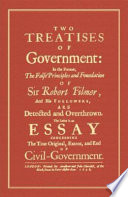 | Fritz Machlup - Biography & Autobiography - 2003 - 224 pages
...introductory motto to the chapter, "The Origins of the Rule of Law" he quotes Locke: "The end of the law is, not to abolish or restrain, but to preserve...violence from others; which cannot be where there is no law: and is not, as we are told, a liberty for every man to do what he lists. (For who could be... | |
 | William F. Jr Cox - Education - 2004 - 558 pages
...true notion is not so much the limitation as the direction of a free and intelligent agent... The end of law is not to abolish or restrain, but to preserve...of laws, where there is no law there is no freedom" (p. 32). While no evidence seems to be available regarding Jefferson's views on the interactive rights... | |
 | Wolfhart Pannenberg - Religion - 2004 - 556 pages
...prescribes no farther than is for the general good of those under that law" (ch. 6, n. 57); "the end of the law is not to abolish or restrain, but to preserve and enlarge freedom" (ibid.).58 Because freedom is not really surrendered in the societal association but only accepts an... | |
 | Chana B. Cox - Biography & Autobiography - 2006 - 302 pages
...very nature of man and to the nature of human freedom. So that, however it may be mistaken, the end of law is not to abolish or restrain, but to preserve...violence from others; which cannot be, where there is no law: but freedom is not, as we are told, a liberty for every man to do what he lists: (for who could... | |
 | Robert L. Popp, John Yen - Computers - 2006 - 768 pages
...seventeenthcentury philosopher who greatly influenced the Founding Fathers, was correct when he wrote: "In all states of created beings, capable of laws, where there...there is no freedom. For liberty is to be free from the restraint and violence from others; which cannot be where there is no law; and is not, as we are... | |
 | John Locke - Law - 2006 - 366 pages
...end of Law is not to abolifh or reftrain, but to preferve and enlarge Freedom 5 for in all the ftates of created beings capable of Laws, where there is...there is no Freedom;; for Liberty is to be free from reftraint and violence from others, which cannot be where there is no Law, and is not as we are told,... | |
 | Richard B. McKenzie, Dwight R. Lee - Business & Economics - 2006 - 651 pages
...that restrict people from attacking one another. This is what John Locke meant when he wrote, "The end of law is not to abolish or restrain but to preserve and enlarge freedom" (Locke 1690, 23). 19 Table 1 .1 The games Fred and Harry can play with property rights Fred respects... | |
 | VD Mahajan - Political Science - 2006 - 936 pages
...of a free and intelligent agent to his true interest... So that however it may be mistaken, the end of law is not to abolish or restrain but to preserve and enlarge freedom". Ritchie observes, "Liberty in the sense of positive opportunity for self-development is the creation... | |
 | Bruce Smith - History - 2006 - 461 pages
...responsibility of a livelihood for himself, and perhaps for others. Therefore, as Locke says, 'the end of law is not to abolish, or restrain, but to preserve and enlarge freedom'31 The argument stands thus; The object of man (upon which all sane people must be agreed)... | |
 | Thomas Szasz - Social Science - 2011 - 293 pages
...interest, and prescribes no farther than is for the general good of those under that law.... The end of law is not to abolish or restrain, but to preserve...violence from others, which cannot be where there is no law; and is not, as we are told, "a liberty for every man to do what he lists." For who could be... | |
| |